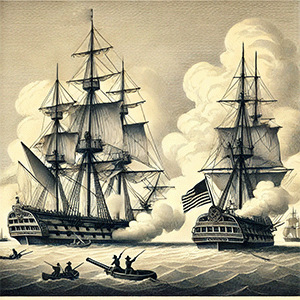 The Chesapeake-Leopard Affair, occurring on June 22, 1807, stands as a significant and contentious event in early American history. This maritime conflict between the United States and Great Britain exemplified the strained relations and escalating tensions that would eventually lead to the War of 1812. Understanding the Chesapeake-Leopard Affair provides critical insight into the complexities of U.S.-British interactions and the fervent American desire to defend its sovereignty and maritime rights.
The Chesapeake-Leopard Affair, occurring on June 22, 1807, stands as a significant and contentious event in early American history. This maritime conflict between the United States and Great Britain exemplified the strained relations and escalating tensions that would eventually lead to the War of 1812. Understanding the Chesapeake-Leopard Affair provides critical insight into the complexities of U.S.-British interactions and the fervent American desire to defend its sovereignty and maritime rights.
In the early 19th century, the world was engulfed in the Napoleonic Wars, a series of conflicts pitting Napoleon Bonaparte’s French Empire against various European coalitions, including Great Britain. These wars had a profound impact on global trade, with both Britain and France attempting to blockade each other’s trade routes. As a neutral nation, the United States found itself in a precarious position, striving to maintain its commercial interests while avoiding entanglement in European conflicts.
One of the most contentious issues between the U.S. and Britain was the British practice of impressment. This policy involved the forced recruitment of sailors from American ships into the British Royal Navy, based on the claim that many of these sailors were deserters from British vessels. The practice of impressment had already led to numerous incidents and mounting American resentment, as it was seen as a blatant violation of U.S. sovereignty and the rights of its citizens.
The Chesapeake-Leopard Affair occurred in the context of increasing British assertiveness on the high seas. The HMS Leopard, a British warship, was on a mission to enforce the impressment policy and capture deserters reportedly aboard the USS Chesapeake, an American frigate. The Chesapeake, commanded by Commodore James Barron, was preparing for a Mediterranean voyage and was not adequately armed or prepared for combat.
On June 22, 1807, the Leopard intercepted the Chesapeake off the coast of Norfolk, Virginia. The British commander, Captain Salusbury Pryce Humphreys, demanded the right to search the Chesapeake for deserters. Commodore Barron, asserting American sovereignty, refused the demand. In response, the Leopard opened fire on the Chesapeake, unleashing a barrage of cannon fire. The Chesapeake, unprepared for battle and significantly outgunned, suffered severe damage, with three sailors killed and eighteen wounded. Barron had no choice but to surrender, and the British boarded the Chesapeake, seizing four sailors, three of whom were American citizens.
The American public was outraged by the Chesapeake-Leopard Affair. News of the incident spread rapidly, inciting calls for retribution and defense of national honor. President Thomas Jefferson, facing immense pressure, responded with a combination of diplomatic measures and military preparations. He issued a proclamation banning British warships from U.S. waters and called for an increase in naval defenses.
Diplomatically, the U.S. demanded reparations for the attack and the return of the seized sailors. The British government, initially dismissive, eventually recognized the diplomatic fallout and offered to return the sailors and provide some compensation. However, the issue of impressment remained unresolved, maintaining a simmering tension between the two nations.
The Chesapeake-Leopard Affair had far-reaching consequences. It heightened anti-British sentiment in the United States and underscored the nation’s vulnerability to foreign aggression. This incident also galvanized American support for a stronger navy and a more assertive foreign policy. Most importantly, it set the stage for the War of 1812, as unresolved issues related to impressment and maritime rights continued to fester.
From the American perspective, the Chesapeake-Leopard Affair was a stark violation of national sovereignty and a direct attack on American honor. The British, on the other hand, viewed their actions as a necessary enforcement of naval discipline and the impressment policy, which they deemed crucial for their war effort against Napoleon.
In the short term, the affair prompted immediate changes in U.S. naval policy, including the strengthening of coastal defenses and an increase in naval shipbuilding. In the long term, it had significant implications for American sovereignty and maritime rights, reinforcing the nation’s determination to protect its interests against foreign interference.
The Chesapeake-Leopard Affair remains a pivotal moment in early American history, illustrating the challenges faced by the young republic in defending its sovereignty on the international stage. The legacy of this event is evident in the subsequent War of 1812 and the enduring American commitment to protecting its maritime rights. By examining the affair in detail, we gain a deeper understanding of the complexities of early U.S.-British relations and the fervent desire for national honor and independence that shaped the nation’s early foreign policy.
Leave a comment